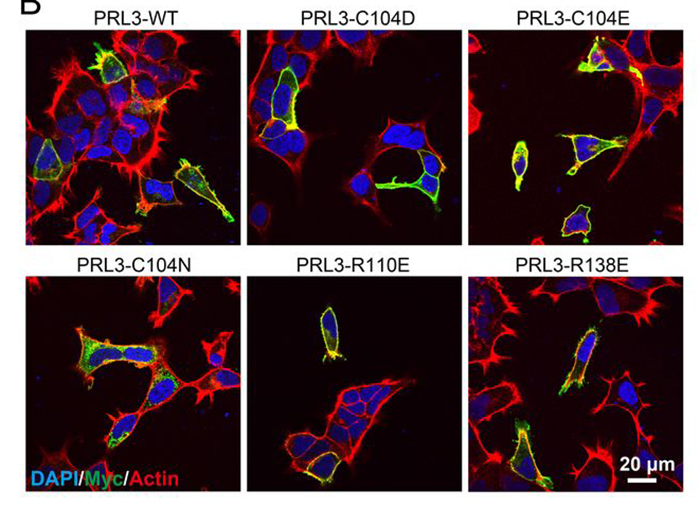Unlocking how cellular proteins control cancer spread
A new insight into cell signals that control cancer growth and migration could help in the search for effective anti-cancer drugs. A McGill University-led study reveals key biochemical processes that advance our understanding of colorectal cancer, the third most common cancer among Canadians.
Using the Canadian Macromolecular Crystallography Facility beamline at the Canadian Light Source at the University of Saskatchewan, scientists from McGill University and Osaka University in Japan were able to unlock the behavior of an enzyme involved in the spread of cancer cells. In a study published in the Journal of Biological Chemistry, the team found that there is a delicate interaction between the enzyme, PRL3, and another protein that moves magnesium in and out of cells. This interaction is crucial to colorectal cancer growth.

"These enzymes were first seen in liver cells that were activated to start growing, so somehow they act as a growth signal," said McGill biochemistry professor and corresponding author Kalle Gehring.
It was generally believed that PRL3 proteins acted as enzymes to control cancer cells. Therefore, it came as a surprise when Gehring and his team found that a mutation that leads to a loss of the enzyme activity still maintained the same influence over cancer growth and migration. "What our new paper showed is that a second activity of PRL3, control of a magnesium transporter, is the signal that instructs the cancer to travel to other parts of the body. It was very exciting that the mutant protein that has no catalytic activity, but still binds very tightly to magnesium transport proteins, turned out to be as oncogenic as the wild-type protein," said Gehring.
The team's findings call into question long-standing hypotheses about the role PRL3 plays in the spread of cancer and indicate that the binding mechanism is somehow key.
Understanding that binding the magnesium transporters and not the enzyme's catalytic activity influences cancer growth and migration signaling is key information for identifying novel compounds to prevent cancer spread. Current drug screening against PRL3 has focused on identifying compounds that block phosphatase activity. By testing the wrong function, the screens may have missed other compounds of therapeutic interest. Shifting the focus to the enzyme's ability to bind to magnesium transporters is one way to help companies identify better therapeutics for cancer through drug screening methods.
Future work will include more detailed studies on the role of the magnesium transporter and its interactions with PRL3.
Enjoy reading ASBMB Today?
Become a member to receive the print edition four times a year and the digital edition monthly.
Learn moreGet the latest from ASBMB Today
Enter your email address, and we’ll send you a weekly email with recent articles, interviews and more.
Latest in Science
Science highlights or most popular articles

Life in four dimensions: When biology outpaces the brain
Nobel laureate Eric Betzig will discuss his research on information transfer in biology from proteins to organisms at the 2026 ASBMB Annual Meeting.

Fasting, fat and the molecular switches that keep us alive
Nutritional biochemist and JLR AE Sander Kersten has spent decades uncovering how the body adapts to fasting. His discoveries on lipid metabolism and gene regulation reveal how our ancient survival mechanisms may hold keys to modern metabolic health.

Redefining excellence to drive equity and innovation
Donita Brady will receive the ASBMB Ruth Kirschstein Award for Maximizing Access in Science at the ASBMB Annual Meeting, March 7–10, just outside of Washington, D.C.

Mining microbes for rare earth solutions
Joseph Cotruvo, Jr., will receive the ASBMB Mildred Cohn Young Investigator Award at the ASBMB Annual Meeting, March 7–10, just outside of Washington, D.C.

Fueling healthier aging, connecting metabolism stress and time
Biochemist Melanie McReynolds investigates how metabolism and stress shape the aging process. Her research on NAD+, a molecule central to cellular energy, reveals how maintaining its balance could promote healthier, longer lives.

Mapping proteins, one side chain at a time
Roland Dunbrack Jr. will receive the ASBMB DeLano Award for Computational Biosciences at the ASBMB Annual Meeting, March 7–10, just outside of Washington, D.C.

